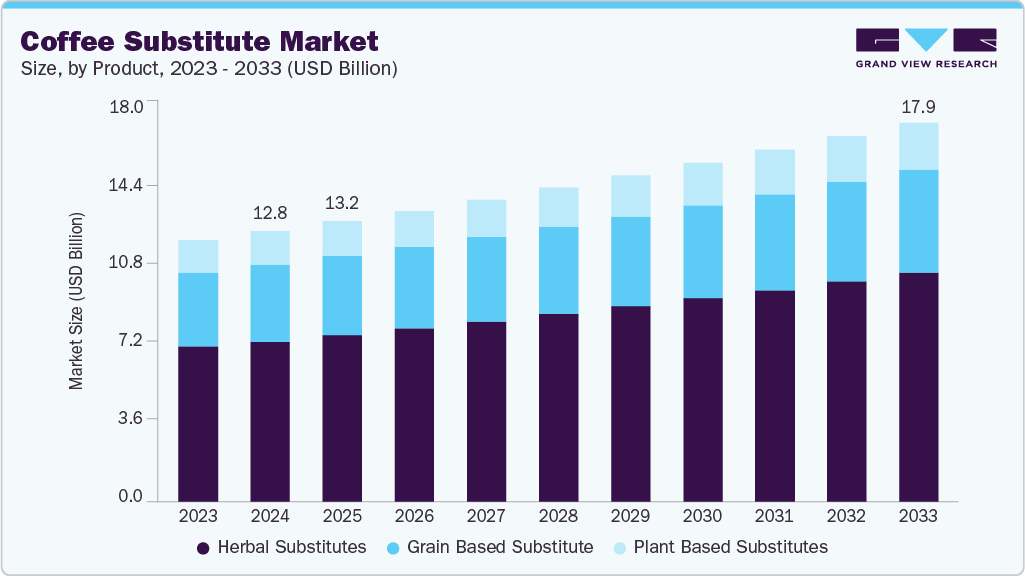Coffee Substitute Market 2033: Asia Pacific's Rapid Growth Story
The global coffee substitute market was valued at USD 12.75 billion in 2024 and is projected to reach USD 17.88 billion by 2033.
The global coffee substitute market was valued at USD 12.75 billion in 2024 and is projected to reach USD 17.88 billion by 2033, growing at a CAGR of 3.8% from 2025 to 2033. This growth is primarily fueled by rising consumer awareness about the health risks associated with caffeine and a broader shift toward health-conscious dietary habits.
Drivers of Market Growth
A growing number of consumers are seeking caffeine-free alternatives due to concerns over caffeine-induced side effects such as anxiety, insomnia, and cardiovascular issues. This trend is particularly evident among individuals sensitive to caffeine, pregnant women, and health-conscious consumers. As a result, there is increasing demand for substitutes made from natural ingredients like chicory, barley, dandelion root, and various herbs.

In addition to being caffeine-free, many coffee substitutes offer nutritional benefits, including fiber, vitamins, and antioxidants. These functional advantages have positioned them as appealing options for consumers interested in digestive health, liver function, and chronic disease prevention.
Sustainability & Natural Product Trends
The market is also benefiting from the rising preference for natural, plant-based, and sustainable products. Coffee substitutes often align with organic and eco-friendly values, especially in markets where consumers are wary of synthetic chemicals and support ethical sourcing. Government initiatives promoting organic agriculture further support this trend, particularly in Europe and Asia-Pacific.
Order a free sample PDF of the Coffee Substitute Market Intelligence Study, published by Grand View Research.
Key Market Trends & Insights
- By Region: Europe led the global market with over 35% share in 2024. This dominance stems from the region’s cultural familiarity with coffee alternatives like chicory, coupled with growing demand for natural, organic, and caffeine-free beverages.
- By Product: The herbal coffee substitute segment was the largest in 2024, generating USD 7.57 billion in revenue. This segment is driven by ingredients such as chicory, dandelion root, carob, and cinnamon, which are recognized for their digestive and liver health benefits as well as antioxidant properties.
- By Distribution Channel: Supermarkets and hypermarkets led the distribution landscape, contributing USD 4.75 billion in revenue in 2024. Their popularity is attributed to convenience, wide product availability, and the increasing appeal of one-stop shopping for health and wellness products.
- By Form: Powdered coffee substitutes accounted for over 60% of the market in 2024. Their growth is due to their ease of preparation, cost-effectiveness, and long shelf life. Powdered formats are especially popular for home use and DIY beverage preparation.
Market Size & Forecast
- 2024 Market Size: USD 12.75 Billion
- 2033 Projected Market Size: USD 17.88 Billion
- CAGR (2025-2033): 3.8%
- Europe: Largest market in 2024
- Asia Pacific: Fastest growing market
Key Companies & Market Share Insights
Key players in the coffee substitute market are employing strategic initiatives such as partnerships, expansions, and product diversification to strengthen their presence and reach a wider consumer base. Many companies are emphasizing sustainable sourcing, health-focused branding, and organic certifications to align with consumer values.
Key Players
- Hand Family Companies
- Anthonys Goods
- The Hain Celestial Group, Inc.
- Rishi Tea and Botanicals
- Teeccino Caffe, Inc.
- Mud Wtr Inc.
- Minus Coffee
- Postum
- Sip Herbals
- Urban Platter
- Micro Ingredients
- Four Sigma Foods, Inc.
- Kein Kaffee
- Dandy Blend
- Nestlé S.A.
Explore Horizon Databook – The world's most expansive market intelligence platform developed by Grand View Research.
Conclusion
The global coffee substitute market is witnessing steady growth, driven by the shift toward healthier, caffeine-free alternatives and increasing interest in organic and functional beverages. Rising awareness of caffeine-related health issues, coupled with the appeal of nutrient-rich, plant-based ingredients, is shaping demand across various demographics.
As Europe continues to lead in terms of market share and Asia-Pacific emerges as a fast-growing region, the coffee substitute industry is set to expand further—supported by trends in wellness, sustainability, and natural nutrition.